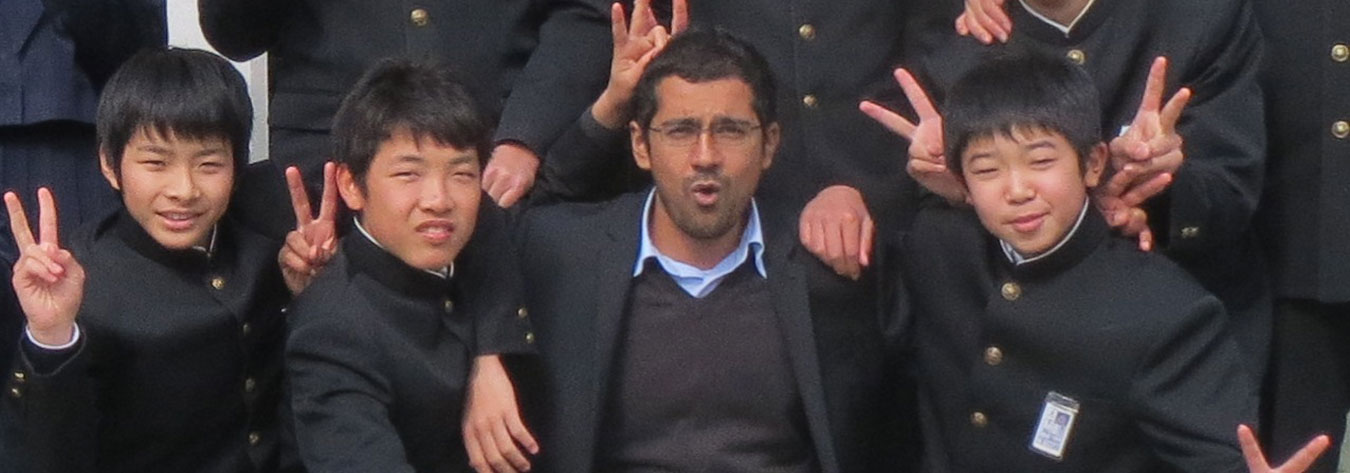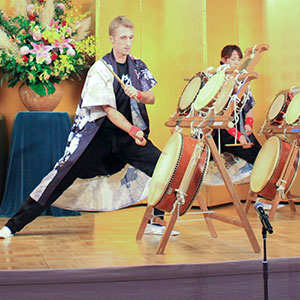Majid Riaz’s interest in Japan began as a child, sifting his way through manga and anime, and later working for a Japanese company based in London.
“It kind of reunited [me with], and got me interested in, Japan again—so I decided to learn Japanese”, he explained. He then read Japanese Studies at the School of Oriental and African Studies, University of London.
In addition, his degree allowed him to study in Hokkaido Prefecture for a year. After graduating, Riaz returned to Japan with the Japan Exchange and Teaching (JET) Programme, which celebrates its 30th anniversary this year, and he has not been back to London since.
As part of the programme, he worked as an Assistant Language Teacher (ALT) on the island of Shikoku in western Japan for five years, with some of his duties including translation work for the local Board of Education.
Now a programme coordinator in the Department of JET Programme Management at the Council of Local Authorities for International Relations (CLAIR), Riaz handles the substantial task of application recruitment, working with a dedicated team of Japanese staff to screen application forms and decide where successful candidates are to be placed.
“I work closely with staff at Japanese embassies and consulates abroad … to help evaluate applicants”, he said.
As one of the few people at CLAIR with previous ALT experience, Riaz uses this to guide and brief new JETs on arrival in Japan.
“I also work in a team doing a lot of work with the Ministry of Education, Culture, Sports, Science and Technology in Japan to help plan orientation workshops for JETs when they arrive”, he said.
Although JETs sign contracts with their local municipal office, Riaz stressed that CLAIR provides continued guidance, training and advice from initial orientation right through to departure.
“We don’t just hand them off to local government offices after they arrive. In addition to the training orientations upon arrival, we provide support throughout the year in the form of presentations and lectures”, said Riaz, who delivers some lectures himself.
These need to “complement what the Ministry of Education have planned policy-wise for English foreign language education”, Riaz explained, adding that CLAIR tries to provide as much support as possible.
A daunting part of moving to Japan is the language barrier. Although Japanese is not a requirement for JET, knowledge of it can be a crucial tool when working in different parts of Japan, and without it participants “sometimes feel slightly isolated”, Riaz explained.
To address this, CLAIR has introduced a full grant for participants who take the Level 3 Japanese Language Proficiency Test (JLPT), and Riaz hopes that this will be rolled out to lower levels soon as well.
Moreover, as many JET participants are in their early twenties and have just graduated from university, this may well be their first experience in the professional working world.
“Having to work outside the environment, social culture and norms in which you grew up is difficult, even more so than coming out just for … university”, Riaz said.
Support for JETs extends to career fairs and internships.
“We invite lots of local companies to come and not just have a presence here for their company, but also actively recruit outgoing JETs”, Riaz said.
This, as well as the JET Programme Alumni Association International, provides a solid base for participants after they leave the programme.
“JET isn’t just a salary and a place to work at, it’s the tools, opportunity and the environment to create a springboard to other things”, he added.
The JET Programme provides a platform to both bring the English language to Japan, and also allow JET participants to take their knowledge of Japanese culture home with them and into the working world.
“In terms of businesses, I know a lot of people go back and use this [experience] in Japanese companies in the UK or British companies in Japan”, Riaz said.
Looking to the future, Riaz said that CLAIR hopes to keep expanding by strengthening their current relationships with local offices, recruiting more local organisations and providing “not just support for local offices, but also for JETs coming over”.
The JET 30th anniversary ceremony, to be held in Tokyo on 7 November, will represent a chance for alumni and current JETs to celebrate what the programme has done for them. Riaz concluded by acknowledging those “in their home country and here in Japan” as a special community in “this extra place to call home”.







